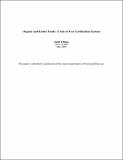| dc.contributor.advisor | Peter Hutt | en_US |
| dc.contributor.author | Ullman, Emily | |
| dc.date.accessioned | 2012-04-18T16:26:32Z | |
| dc.date.issued | 2009 | |
| dc.identifier.citation | Emily Ullman, Organic and Kosher Foods: A Tale of Two Certification Systems (May 2009). | en_US |
| dc.identifier.uri | http://nrs.harvard.edu/urn-3:HUL.InstRepos:8592150 | |
| dc.description.abstract | Food products may be labeled with respect not only to their ingredients and nutritional content, but also to their adherence to various ethical or religious process-based standards. Because consumers view these claims as desirable, both private organizations and government have sought to ensure that the claims are accurate and meaningful. However, this has been accomplished in very different ways with respect to two particular labels: organic and kosher. Organic food producers are governed by a federal regulatory regime that imposes a minimum standard for organic processes and a maximum with respect to what claims may be made, increasing standardization and consumer education but decreasing consumer choice and effective enforcement. Kosher producers, in contrast, contract with private certification organizations with individual standards and state regulation occurs only with respect to fraud; the effects are opposite. Choosing which regime to apply to future process-based claims requires an analysis of the claim’s potential consumer base. | en_US |
| dash.license | LAA | |
| dc.subject | food and drug law | en_US |
| dc.subject | Food-Dietary supplements-organic food | en_US |
| dc.subject.other | Food and Drug Law | en_US |
| dc.title | Organic and Kosher Foods: A Tale of Two Certification Systems | en_US |
| dc.type | Paper (for course/seminar/workshop) | en_US |
| dc.relation.journal | Food and Drug Law: An Electronic Book of Student Papers | en_US |
| dc.date.available | 2012-04-18T16:26:32Z | |


